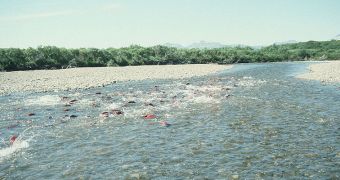Officials with the World Wildlife Fund (WWF) are saluting the release of the latest report by the UN Food and Agriculture Organization (FAO) on the state of the world's oceans, lakes and rivers.
These areas are responsible for providing food for a huge portion of the global population, and so the document also has implications for global food security as well. The main focus of the report is the conflict between increasing fish demand and collapsing fisheries.
The latter phenomenon is taking place all over the world, as fisheries are getting depleted, and asked to compete at an unnaturally-fast pace. Most of them cannot even ensure the necessary minimum for areas around it to survive.
Others are on the brink of collapse, and will most likely lose their ability to sustain human populations due to the increasing demands that they are subjected to. Data such as these are included in the FAO State of the World’s Fisheries and Aquaculture (SOFIA) report.
Representatives with the UN Agency released the document today, January 31, in Rome, Italy. One of the main conclusions in the report was that 53 percent of all fisheries in the world are fully exploited.
This is an 85 percent increase in number from past years. Additionally, it was also established that 32 percent of all fisheries were over-exploited, depleted or recovering from depletion, the WWF reports.
The proportion of fisheries capable of producing higher catches, or that are under- or moderately-exploited has dropped to just 15 percent, which is the lowest level recorded since the mid-1970s.
“In a world likely to face a future of increasing food prices and decreasing food security it is becoming more and more apparent that running down one fishery after another is a disaster in the making,” says the leader of the WWF global Smart Fishing Initiative, Alfred Schumm.
“There are many promising initiatives and it is important to give recognition to the fisheries and fish farms that have achieved or are working towards operating sustainably,” he adds.
“What this report show us is that we cannot relax our efforts to bring long term sustainability to a key element of global food security,” the WWF representative goes on to say.
Experts who created the SOFIA report say that 8 percent of the world's population is entirely dependent on marine animals as their primary source of food. That's more than 540 million people.
“That’s a lot of people relying on a sector dependent on a declining resource, at least as far as fisheries are concerned. If we don’t properly manage our oceans, we face not only an environmental disaster, but a social one too,” adds Dr Robin Davis, the deputy leader of the WWF Smart Fishing Initiative.

 14 DAY TRIAL //
14 DAY TRIAL //